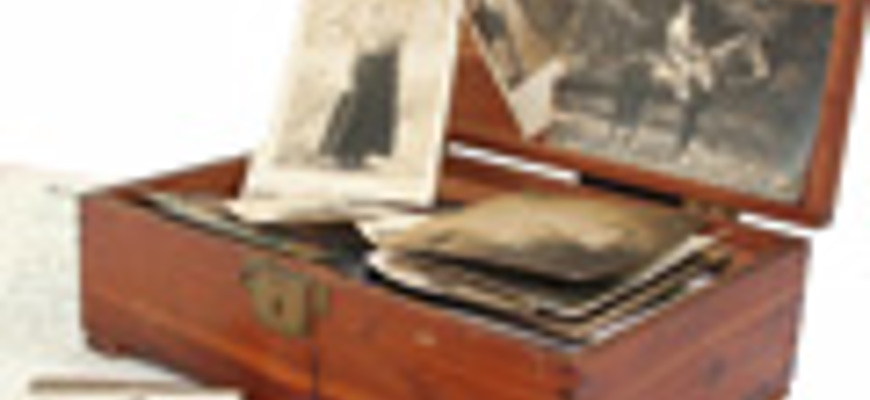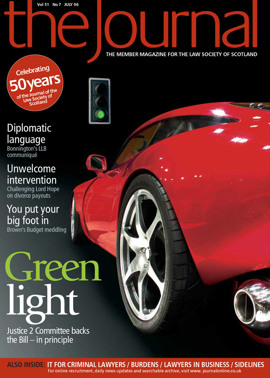Executries sponsored feature

Despite the best efforts of practitioners, the majority of estates in Scotland still devolve on intestacy. Whilst in most cases the next of kin are within the immediate family, occasionally they will be in the class of uncles and aunts of the whole blood, in most cases by representation to their various issue.
How many? Where?
Such cases may involve large family trees, with dozens of entitled members, often first cousins and first cousins once removed. Realistically, few of us keep in contact with all of our cousins throughout our lives and this is even less likely for an elderly deceased who was the child of late-Victorian parents, given the size of Victorian families. In these circumstances it is advisable to call on the services of a professional genealogist to reconstruct the family tree and locate all the entitled kin. The average extended Scots family usually spreads south of the border and in many instances across the globe.
Of course, the genealogist’s expertise comes at a price and no researcher should be instructed without first providing an estimate of the likely costs. Whilst the size of the task is generally unknown at the outset, it should be possible to provide a rough guide as to the potential costs.
Improved records
A modestly sized family tree may not prove too costly to reconstruct. Regrettably, the size of a family tree is not necessarily in proportion to the value of the estate. Fortunately for beneficiaries, average estate values are increasing whilst the quality and availability of genealogical resources continues to improve. The records at New Register House in Edinburgh, now largely electronic, provide a resource which is second to none in the world.
The costs of researching the heirs will generally be justifiable on a typical estate involving, say, a property and some savings. However, until confirmation is obtained it may not be possible to access sufficient funds to cover the costs of the investigation.
Bonds of caution
Before formal appointment of an executor-dative can be made it is necessary to obtain a bond of caution. It is commonly believed that it is first necessary to know the full extent of the family, i.e. the identities of all the insured parties. This would present the practitioner with a catch-22 situation, as you would need the bond to obtain confirmation in order to access funds to finance the research to reconstruct the family tree. However, the insurers who currently underwrite bonds (Royal & Sun Alliance, and the Zurich), may be willing to issue the bond in advance of research if the legal practitioner (not the proposed executor) signs an assurance that (1) the estate will not be distributed, and (2) the estate funds will be held by the solicitor, until such time as the family tree has been thoroughly investigated.
Choice of executor?
Another stumbling block to the application for confirmation is the view widely held by practitioners that a member of a class of kin who benefits directly from the estate is preferred to someone who benefits by representation of a predeceasing parent, for example an uncle over a first cousin. In a small, known family this might not cause a problem, provided the older relative is in reasonable health. However, if you are in contact with surviving cousins but a large proportion of the family tree remains unknown, you cannot say with conviction that there are no surviving uncles and aunts.
Enquiry to one of the sheriff courts referred me to Currie on Confirmation of Executors (8th ed, 1996), which, in section 6.56, states: “Any person sharing in the deceased’s estate under the intestate succession rules may be decerned as executor-dative. Where there is competition for the office of executor-dative, between a person who inherits by virtue of representing a deceased parent, and someone who inherits in their own right, the latter will be preferred to the office.”
My reading of this is that provided a first cousin proposed as executor is beneficially entitled under the Succession (Scotland) Act 1964, they can be confirmed as executor-dative. Presuming, of course, that no elder relative (by generation) elects to compete for the position, the sheriff should look favourably on the application. It may nonetheless be advisable to discuss the particular circumstances of the case with your local sheriff court before making the application.
Provided the value of the estate is sufficient to make the matter viable, therefore, effective consultation with your genealogical research adviser, caution insurer and the sheriff court should ensure that the executry administration can get off on the right foot, and, ultimately, be brought to a successful conclusion.
Andrew Walsh, BA (Hons) is account manager at Title Research. He lectures on the subject of missing beneficiaries and the apportionment of costs of finding them or insuring against their independent emergence. Title Research is authorised as an external CPD provider by the Society of Trust and Estate Practitioners.
True life stories (Roger Hooper)
For solicitors and trustees, tracing missing beneficiaries can bring real risks, says Roger Hooper, chairman of Hoopers. Successfully tracing near kin and other beneficiaries is no guarantee of receiving instructions. There may even be the danger of a claim against the solicitor’s own firm should more beneficiaries come forward after assets have been distributed. Instructing a firm of probate genealogists should avoid the risk of incurring costs in terms of lost time as well as money.
Hooper explains that research can be done on a no-find, no-fee basis or for an agreed hourly rate. An initial report can be provided typically within hours and the fee can be paid from the estate.
Despite the increasing amount of information available on the internet, not all knowledge can be gleaned that way.
- Hooper tells how his firm traced one family with two branches, all farmers living in quite wild rural areas. When the researcher arrived at one farmhouse on a dark and stormy night, the door was opened by a woman with a shotgun, who chased him off the property. Some hours later, her husband came home and let the researcher in – explaining the hostilities with “her brother killed their father and she thought you came from over there”.
- Less perilous but equally dramatic was the deadpan response from another family when asked for the whereabouts of brother John (at stake were shares in a distant cousin’s estate): “Jack the Hat? He’s propping up the M4 now.”
- Untangling cases can prove complicated. In one instance a man born in South Africa died in Southend. He had a common Boer family name, which made a birth certificate exceptionally difficult to pin down. But Hoopers discovered he had worked in the Merchant Navy, and his navy records were accepted as proving his identity and leading to his heirs.
- Families are still reaping legacies from the Second World War, increasingly often as families once split by the Cold War come together again. Typically these are brothers and sisters from Poland, Russia or the Ukraine who last saw each other in a Nazi concentration camp, and later feared to make contact in case of repercussions on relatives behind the Iron Curtain. “We have good networks that enable us to bring them a bit of sad news, accompanied by a bit of good news”, says Roger Hooper.
More than face value
Coins and medals are often overlooked in people’s estates. Coins are generally kept as keepsakes, or investments in the gold variety such as sovereigns and krugerrands, whilst medals are inherited family possessions and tend to have sentimental value that outweighs their commercial value. However, it is often not appreciated just how valuable medals can be.
Coins are traditionally valued by rarity and condition but with medals, it is the specialist knowledge of the person named on the medal that can transform a humble looking medal into one of greater significance. This can be as a result of an action within the campaign for which the medal was awarded, or indeed because of who that person was, their ship or regiment and what they did in that war. Equally, photographs, diaries, documents and other ephemera that relate to the medal and the person to whom it was awarded can have a significant bearing on value, particularly in the case of World War 2 where medals were mostly issued unnamed.
There is many a story of unresearched medals being sold for much less than they are worth, and this is where a firm such as DNW, the UK’s largest numismatic auction house, can make such a difference to family members and surviving medal holders, in netting them many thousands more pounds for their medals.
In one recent case, the widow of a wartime bomber pilot, who had been offered a few thousand pounds for her late husband’s group of medals by a dealer but was then recommended to visit an expert, was informed that the medals were worth around six times what she had been offered as her husband had participated in a famous raid over enemy lines. After the story was promoted and with a good press the medals were sold for £74,000, over 12 times what the dealer offered and a huge financial bonus for the widow.
Collectors tend to have themes of interest, such as Scottish regiments, medals to doctors, a period such as the Indian Mutiny, or, with the boom in family research, family-related names. The interests are endless but the overriding theme is “The man behind the medal”. The research is as much part of the collector’s passion as is the medal itself.
DNW, who have over 100 years’ expertise, hold a military library of over 10,000 volumes at the last count – probably the largest outside a major public institution such as The British Library.
They offer sale by auction or by private treaty, where discretion is preferred.
Christopher Hill is Director Client Services at DNW, (t: 020 7016 1700; e: christopher@dnw.co.uk).
In this issue
- Challenging times
- A block on service
- Revving up for debate
- LLB confidential
- Clean break under attack
- The hokey-cokey Chancellor
- Switching channels
- The Chancellor gets it REIT
- Executries sponsored feature
- The EU and the criminal
- Case for the defence
- To act or not to act... that is the question!
- A summary matter
- Ireland 4, Italy 0
- The route ahead
- Scottish Solicitors Discipline Tribunal
- Website reviews
- Book reviews
- Is that burden dead yet?






